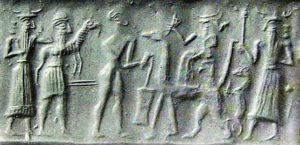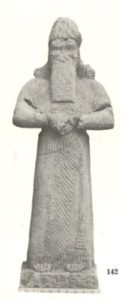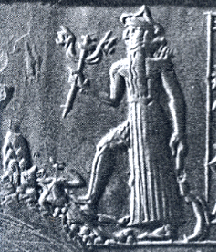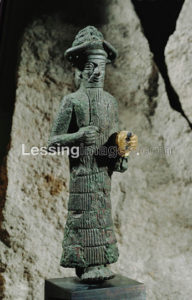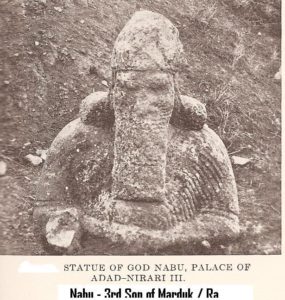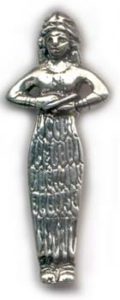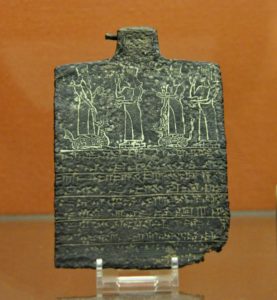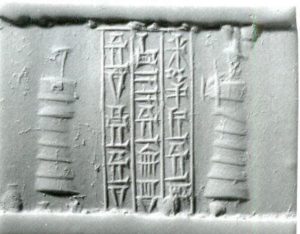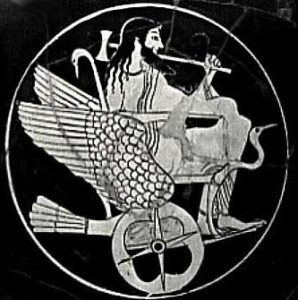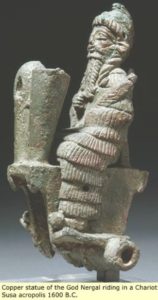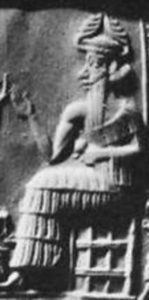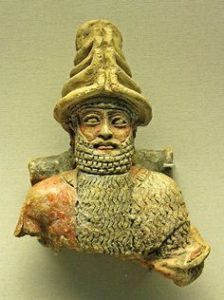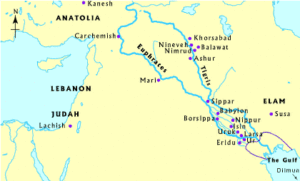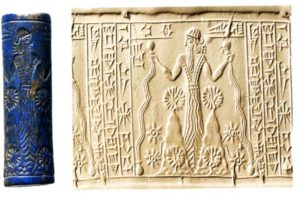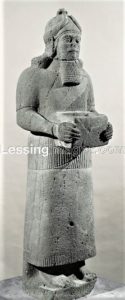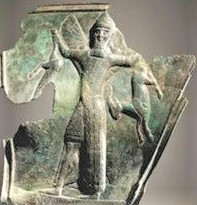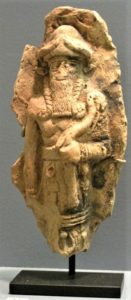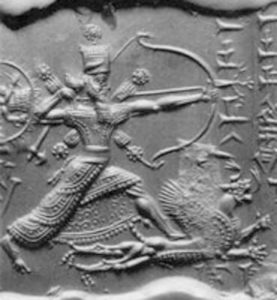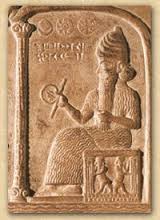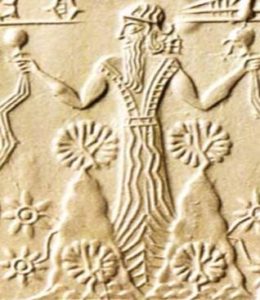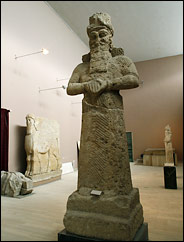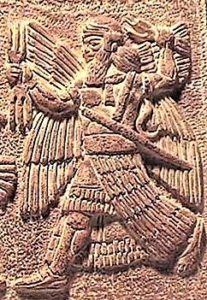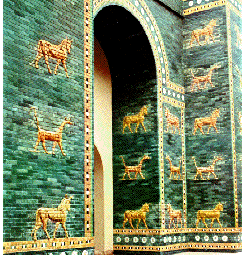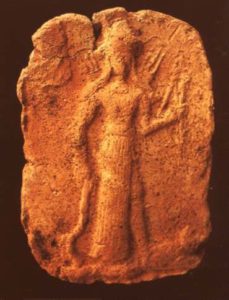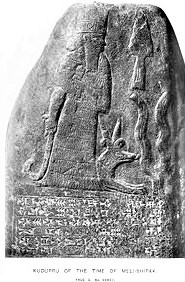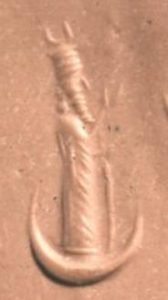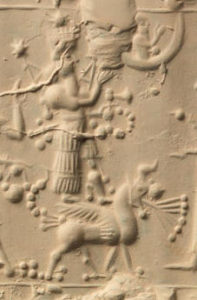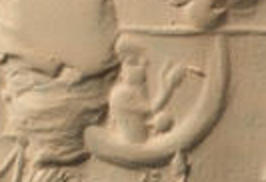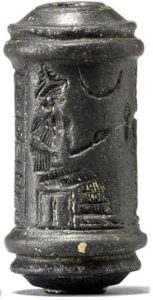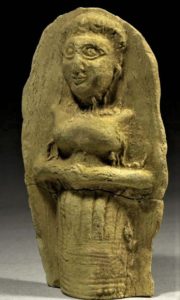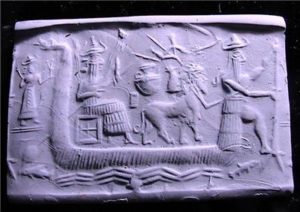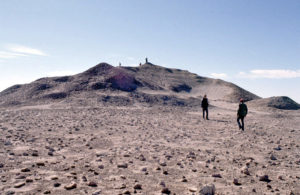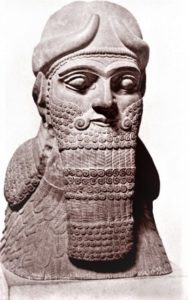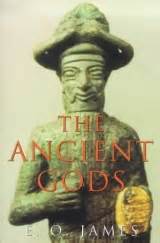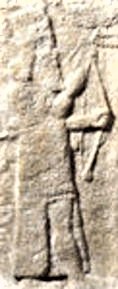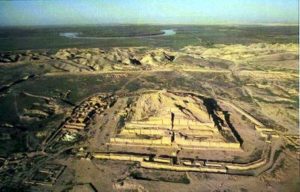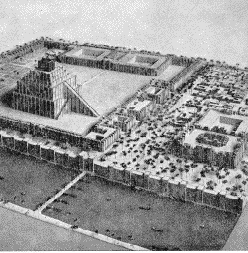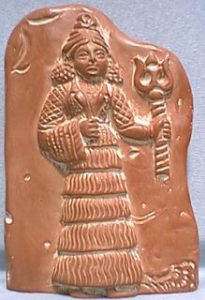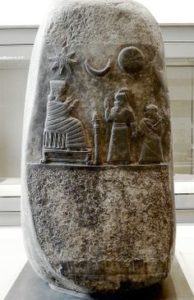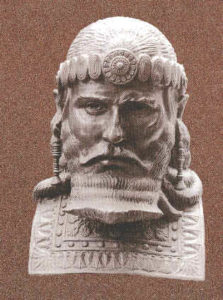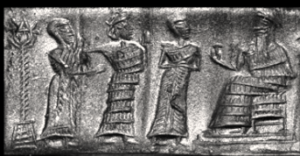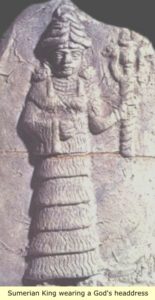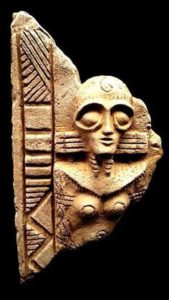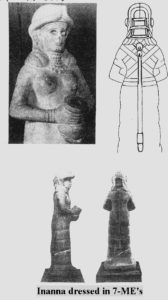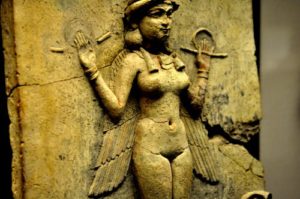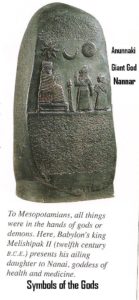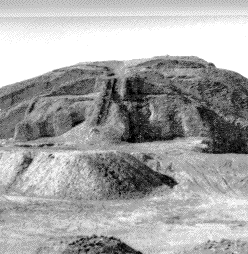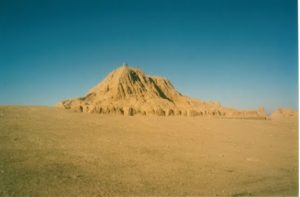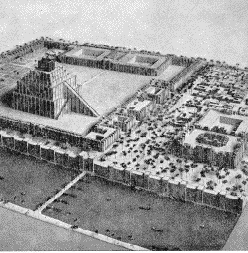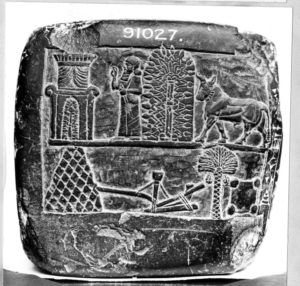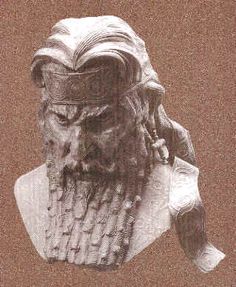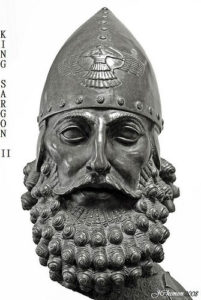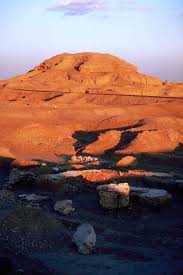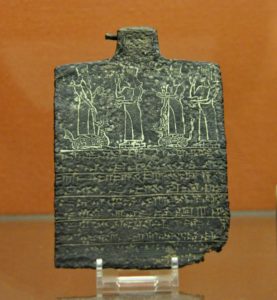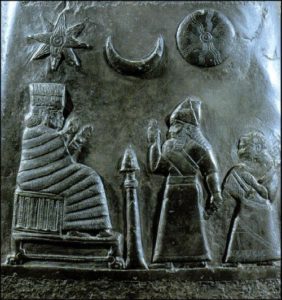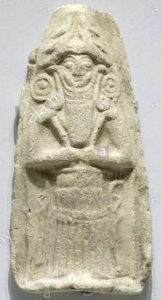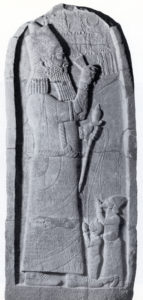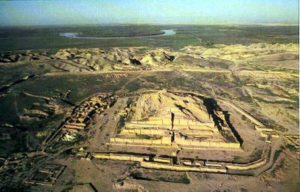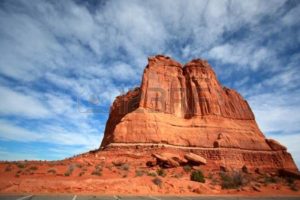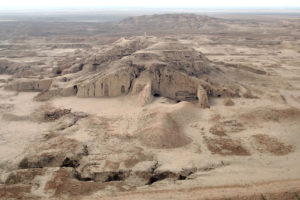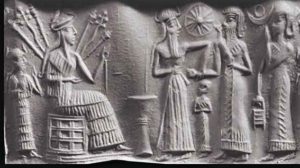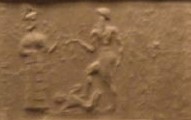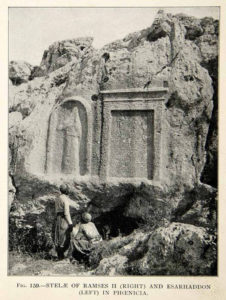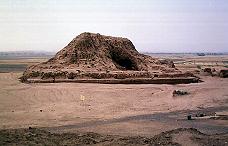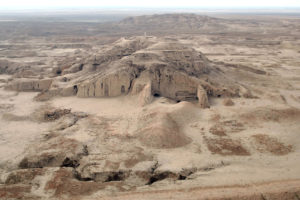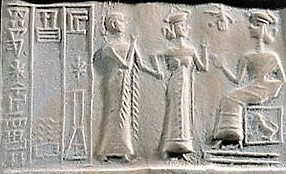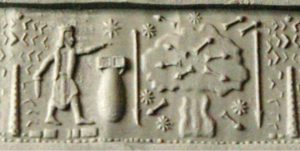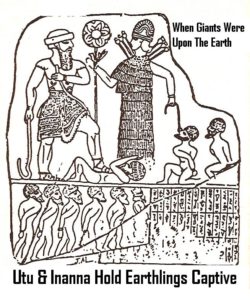(Texts: All Artifacts, Color Coding, & Writings in Bold Type With Italics Inside Parenthesis, are Added by Editor R. Brown, not the Authors, Translators, or Publishers!)
(gods in blue … mixed-breed demigods in teal)

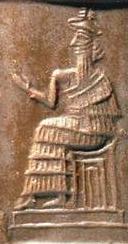 (Enlil, King Anu’s son & heir, Earth Colony Commander)
(Enlil, King Anu’s son & heir, Earth Colony Commander)
To the god Marduk, the great lord, the Enlil of the gods (supreme leader), the proud one,
the one who directs the Igīgū (Igigi) gods, the one who controls the Anunnakū gods,
the light of the gods — his ancestors — the one who dwells in Esagil, the lord of Babylon, my lord:
Nabopolassar, governor of Babylon, king of the land of Sumer and Akkad,
(son Nabu, Babylonian mixed-breed king with dinner, earthling worker, Marduk seated upon his throne, & son Ashur)
pious prince, protégé of the gods Nabû and Marduk, the humble (and) respectful one
who thoroughly understands how to revere god and goddess in his heart,
the one who provides for Esagil and Ezida, the one who is assiduous towards the rites of the great gods, I:
When, by the commands of the gods Nabû and Marduk, the beloved of my royal majesty,
and (with) the strong weapon of the awesome god Erra (Nergal),
the one who constantly strikes my enemies with lightning (alien technologies),
I killed the Subarean (Assyrian) (and) turned his land into a mound of ruins (lit. “a mound [and] ruins”),
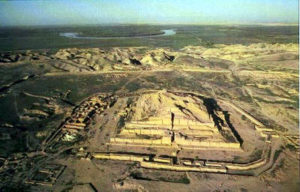 (Etemenanki, Marduk’s ziggurat residence in Babylon)
(Etemenanki, Marduk’s ziggurat residence in Babylon)
at that time, (as for) Etemenanki — the ziggurat of Babylon, which had become very weak
(and) had been allowed to collapse before my time — the god Marduk — (my) lord —
commanded me to firmly secure its foundation on the surface (lit. “breast”) of the netherworld
(and) to have its summit rival the heavens.
I fashioned hoes, spades, and brickmolds (made) of elephant ivory, ebony, (and) musukkannu-wood,
and (then) I made the vast number of workmen levied in my land carry (them).
I had (them) make bricks without number (and) mold baked bricks like countless drops of rain.
I had the Araḫtu canal carry off refined (and) crude bitumen like a raging flood.
With the knowledge of the god Ea (Enki), with the perspicacity of the god Marduk,
with the wisdom of the god Nabû and goddess Nisaba,
with the vast mind that the god who created me had allowed me to attain,
(and) with my great sense of reason, I deliberated (matters) and (then) I commissioned well-trained craftsmen
and (afterwards) a survey team measured the dimensions using a measuring rod.
Master builders stretched out the (measuring) ropes (and) firmly established the ground plan.
 (Babylonian King Hammurabi & Utu seated)
(Babylonian King Hammurabi & Utu seated) 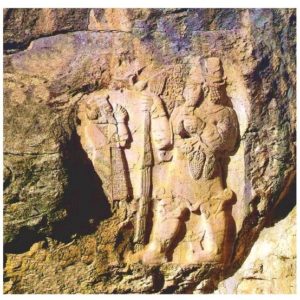 (semi-divine king & giant Adad)
(semi-divine king & giant Adad)
I made inquiries through divination to the gods Šamaš (Utu), Adad, and Marduk,
and whenever (my) mind deliberated (matters) and took the dimensions into consideration,
the great gods responded to me through the outcomes of divination.
 (3 sons, son Marduk the eldest, & father Enki seated)
(3 sons, son Marduk the eldest, & father Enki seated)
Through the craft of the exorcist, the wisdom of the gods Ea and (his eldest son) Marduk,
I made that place pure and firmly set its foundation(s) on (its) original socle.
I laid out gold, silver, (and) stones from the mountains and sea in its foundations.
I poured out glistening ṣapšu, fine oil, aromatics, and dāmātu-paste beneath the brickwork.
I fashioned statue(s) of my royal majesty carrying a basket and had (them) placed in the foundation.
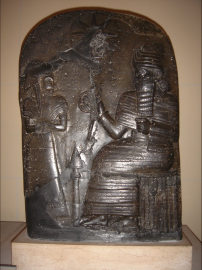 (Babylonian semi-divine mixed-breed king receives instructions from patron giant god Marduk)
(Babylonian semi-divine mixed-breed king receives instructions from patron giant god Marduk)
I bowed (my) neck to the god Marduk, my lord, rolled up (my) garment,
the ceremonial attire of my royal majesty, and carried mud bricks (lit. “bricks and mud”) on my head.
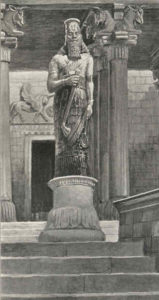 (semi-divine giant king Nebuchadnezzar II)
(semi-divine giant king Nebuchadnezzar II)
I had baskets made from gold and silver and I made Nebuchadnezzar —
(my) first-born child, the beloved of my heart — carry, with my workmen,
mud that was mixed with wine, oil, and crushed aromatics.
I made Nabû-šuma-līšir — his talīmu-brother, a child who is my (own) offspring,
(his) younger brother, my favorite — take up the hoe (and) spade.
I imposed (upon him) a gold and silver basket and gave (him) as a gift to the god Marduk, my lord.
In joy and happiness, I built the temple as a replica of Ešarra and I raised its superstructure up like a mountain.
For the god Marduk, my lord, I made it suitable to be an object of wonder, just like it was in earlier times.
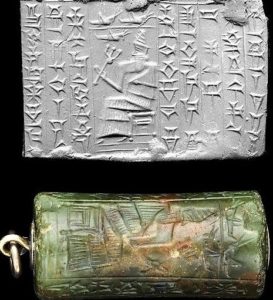 (Marduk, aggressive alien giant god)
(Marduk, aggressive alien giant god)
0 Marduk, (my) lord, joyfully look upon my good deeds and by your exalted command, which cannot be altered,
may (this) construction, my handiwork, stay in good repair for ever.
Like the bricks of Etemenanki, which are firmly in place for eternity,
firmly secure the foundation(s) of my throne until the distant future.
0 Etemenanki, pray on behalf of the king who renovated you!
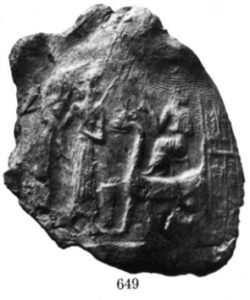 (semi-divine king brought by Nabu before giant god Marduk on Mushhushu)
(semi-divine king brought by Nabu before giant god Marduk on Mushhushu)
When the god Marduk takes up residence inside you in joy,
O temple, speak favorable things (about me) to the god Marduk, my lord.
